After being considered a favourite to get relegated at the start of last season, Fortuna Düsseldorf proved to be a pleasant surprise in the Bundesliga. Highlighted by a 2-1 victory over Borussia Dortmund, a 3-1 victory over Borussia Mönchengladbach, and draws against Bayern Munich and RB Leipzig, the club enjoyed their best league season in 19 years, finishing 10th. Now, manager Friedhelm Funkel will be looking to extend his team’s stay in the top flight. While the most notable transfer Düsseldorf completed was the outgoing move of breakout striker Dodi Lukebakio, the incoming players will give the squad a fighting chance. One such player is American goalkeeper Zack Steffen.
This tactical analysis will delve into how Zack Steffen plays in front of goal and what his role will be as a goalkeeper for Düsseldorf.
Background
Steffen didn’t begin his youth football career as a goalkeeper. He initially played as a defender until, at the age of 10, his team’s keeper couldn’t make it to a match. Steffen stepped in and hasn’t looked back since. Eventually, he left his home country and headed abroad. In his first stint in Germany, Steffen recorded mixed results with Freiburg II. He returned to the United States after about a year and a half overseas.
Steffen signed with the Columbus Crew in summer 2016. After three highly successful seasons in Ohio, including winning MLS Goalkeeper of the Year in 2018, Steffen was sold for a league-record fee for goalkeepers to defending Premier League champions Manchester City. In the City Football Group system, the plan was to send Steffen out on loan to develop his skills with analysis and consistent playing time. That time came from Düsseldorf.
Shot-stopping and positioning
First and foremost, Steffen’s best trait is his shot-stopping ability. The 24-year-old has an exceptional reaction time and uses his frame to stretch well across goal. In his breakout MLS season of 2017, Steffen tied for fourth in saves, with 98 in 34 matches.
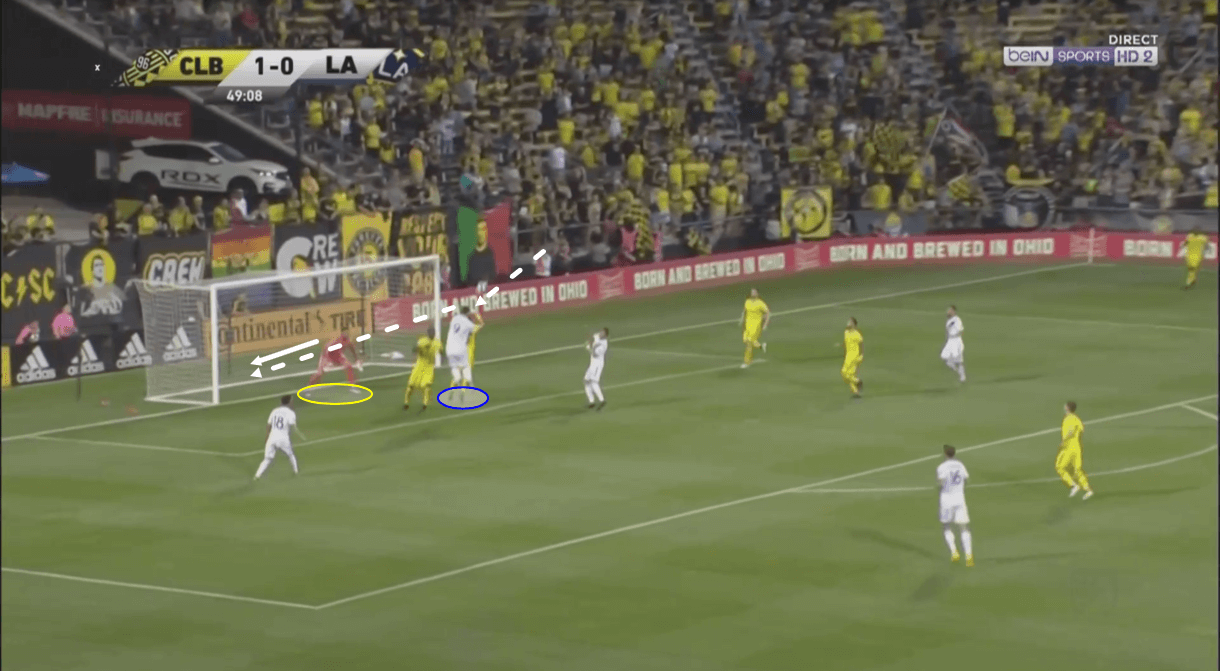
Steffen’s diving ability is one of the best to come out of the United States keeper pool in recent years. He makes his body big and covers as much space near the shot as possible. This dedication is a large factor as to how Steffen makes so many key saves in late-game situations. Throughout his career, Steffen has made a total of eight penalty saves out of 22 total penalties taken against him, good for a 36.4% penalty save percentage. He fully commits to his dives on penalties, preferring to cover the chosen side completely down to the post as opposed to attempting to limit the penalty taker’s decision.
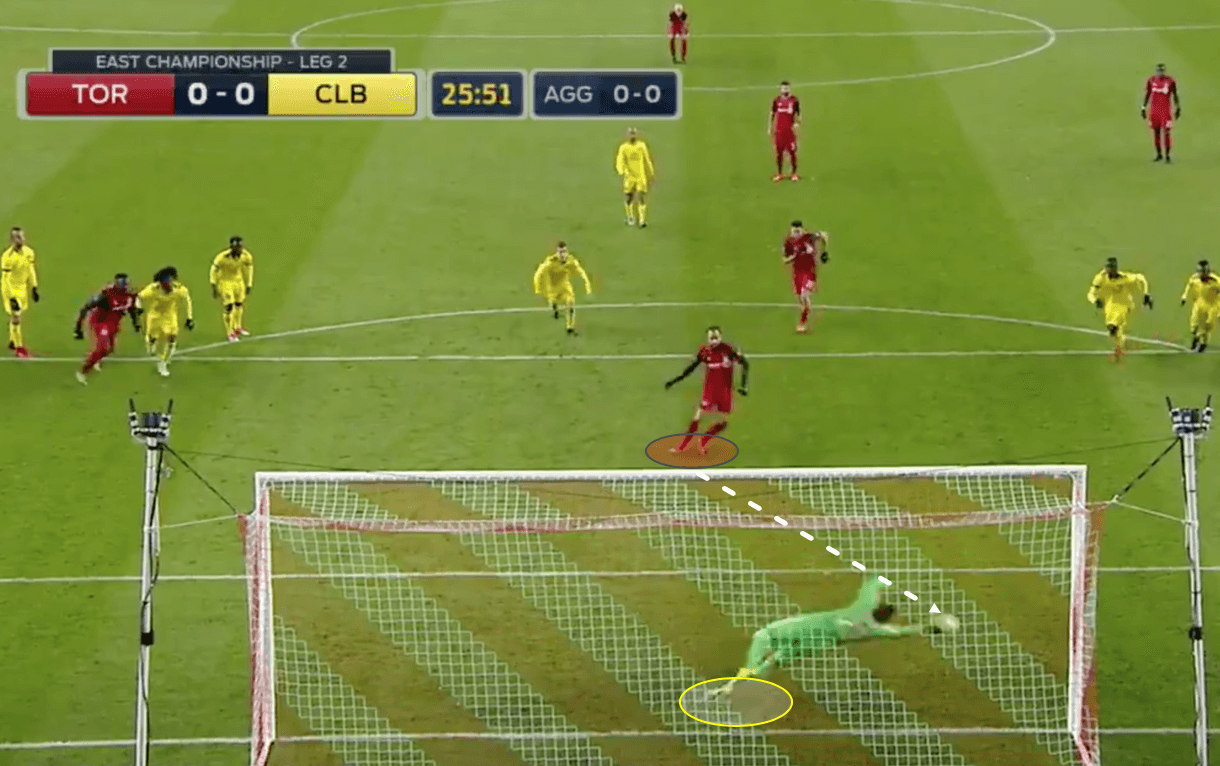
Steffen has already shown some of his goalkeeping skills in an overall positive start in his career at Düsseldorf. He started the first round match of the DFB-Pokal against FC 08 Villingen, making a few strong saves despite conceding a penalty. Düsseldorf defeated the Oberliga club 1-3 after extra time, with Steffen playing the full 120 minutes.
One potential pitfall of Steffen’s style of play is possible over-commitment. At Columbus, and at times for the United States National Team, Steffen often enjoyed playing aggressively. While the sweeper-keeper role is an admirable and rather adrenaline-filled one, it can easily leave the keeper prone to mistakes.
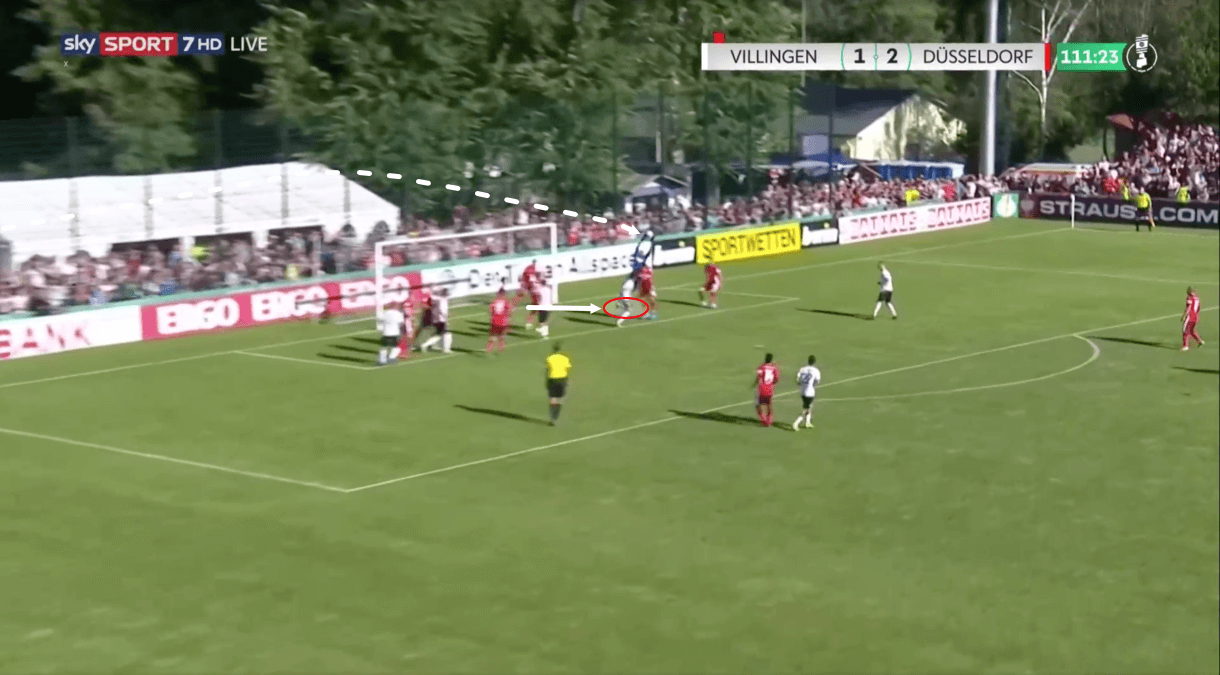
In this situation, Steffen commits to catching a corner kick. This is an example of how aggressive goalkeeping can be beneficial. However, as stated, over-commitment can result in the keeper’s positioning leading to errors.
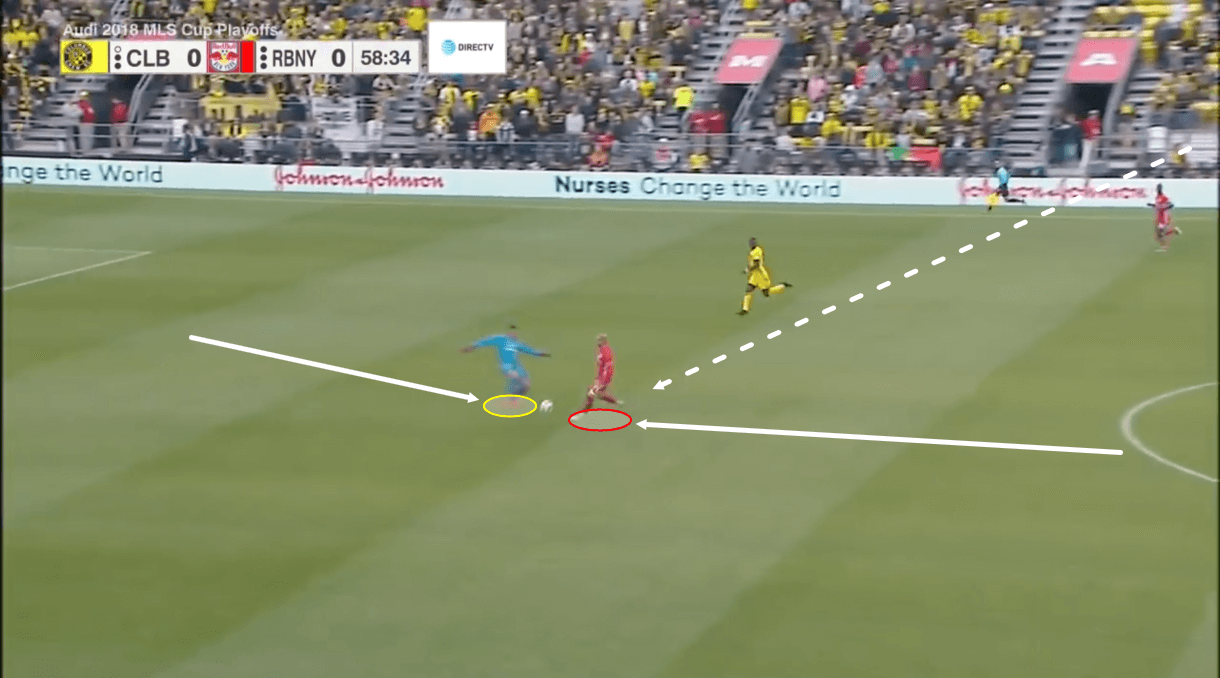
Over in Europe, Steffen’s sweeper positioning can lead to errors against opposition technically superior to MLS. The better the ability to keep the ball closer to the feet, the better chance the attacker has of out-manoeuvring the sweeper-keeper.
Another example of Steffen’s positioning which still needs work is his placement on angles.
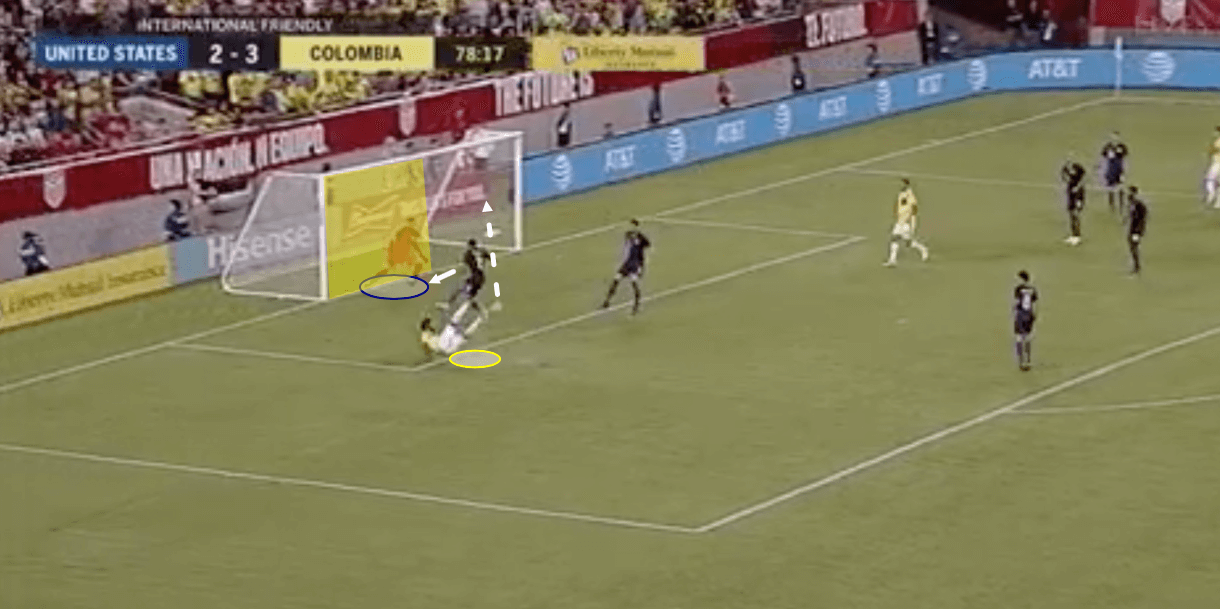
In the figure above, Steffen has slid over to the near-post side of the goal, as the ball was passed to an opponent near that side. However, while he is able to cover that half of the goal, the momentum of his slide has limited his potential reach to the far side of the goal, resulting in a goal into the far edge of the net.
As with many football traits, Steffen’s positioning has seen both positive and negative effects. If he can learn to control and judge his commitment in such a way adaptive to the Bundesliga, it could go a long way in his first season at Düsseldorf.
Distribution
Another mostly positive aspect of Steffen’s play is his passing distribution. While not without the rare passing mistakes, Steffen is capable of making both short and long passes consistently. His relative patience and calmness under pressure are mature for his age.
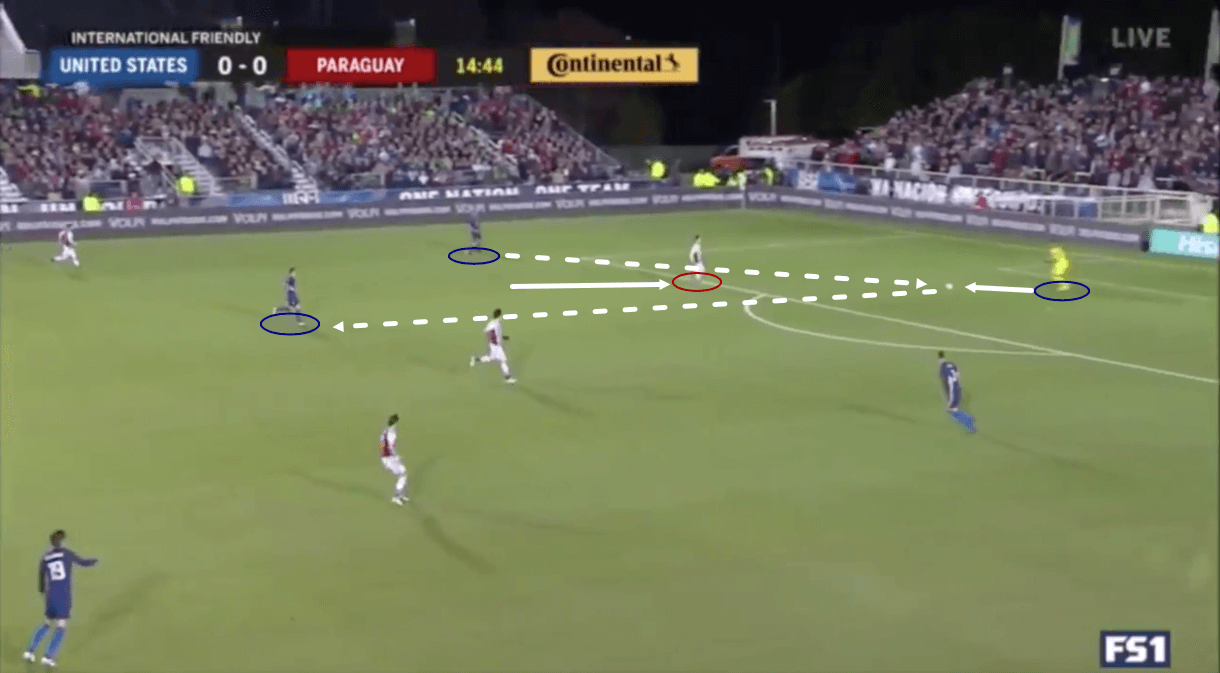
In the above figure, Steffen receives a back-pass as the opposing attacker presses him. Steffen still manages to calmly complete a pass, breaking the front pressing line of the opponent.
At his Bundesliga club, Steffen’s long passing ability will likely be just as, if not more, valuable than his short passing. He has proven he can ping accurate long balls into teammates’ runs or into a small area.
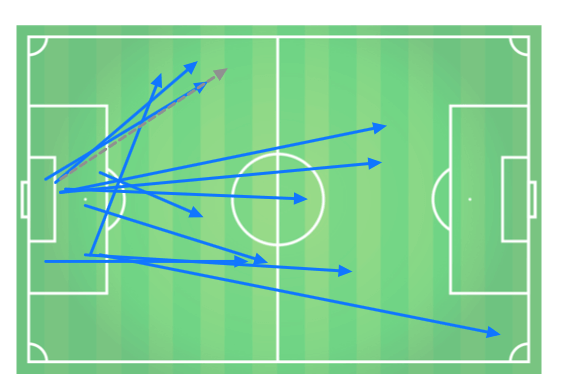
An excellent example of Steffen’s long ball passing is shown below.
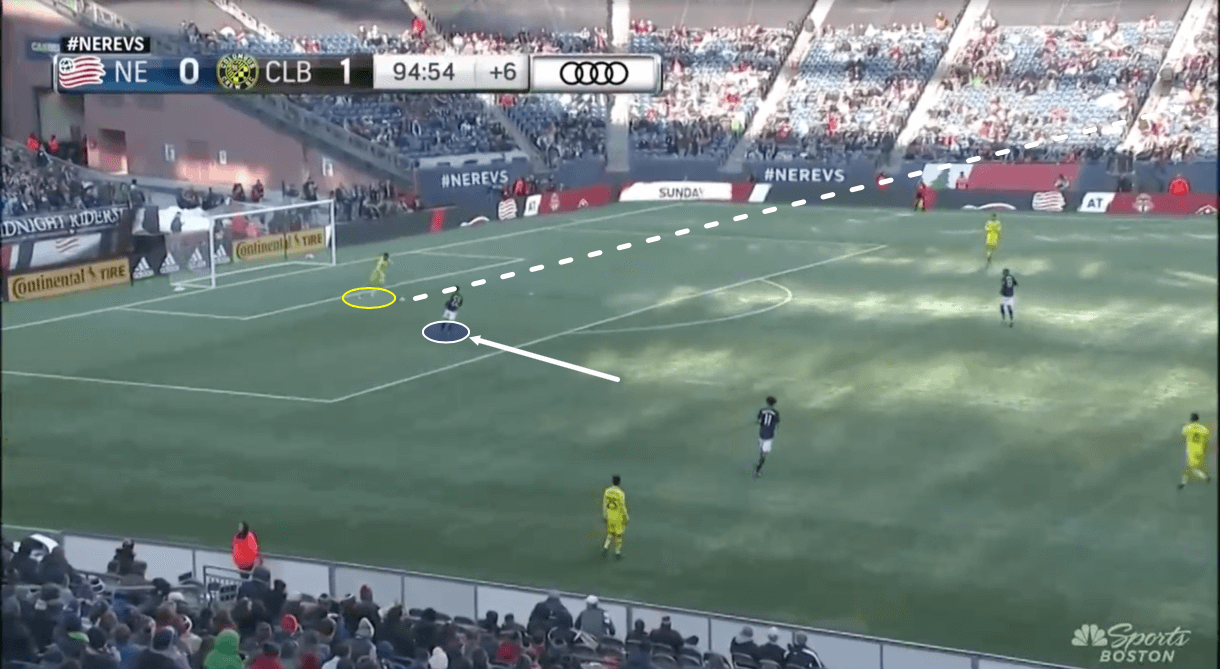
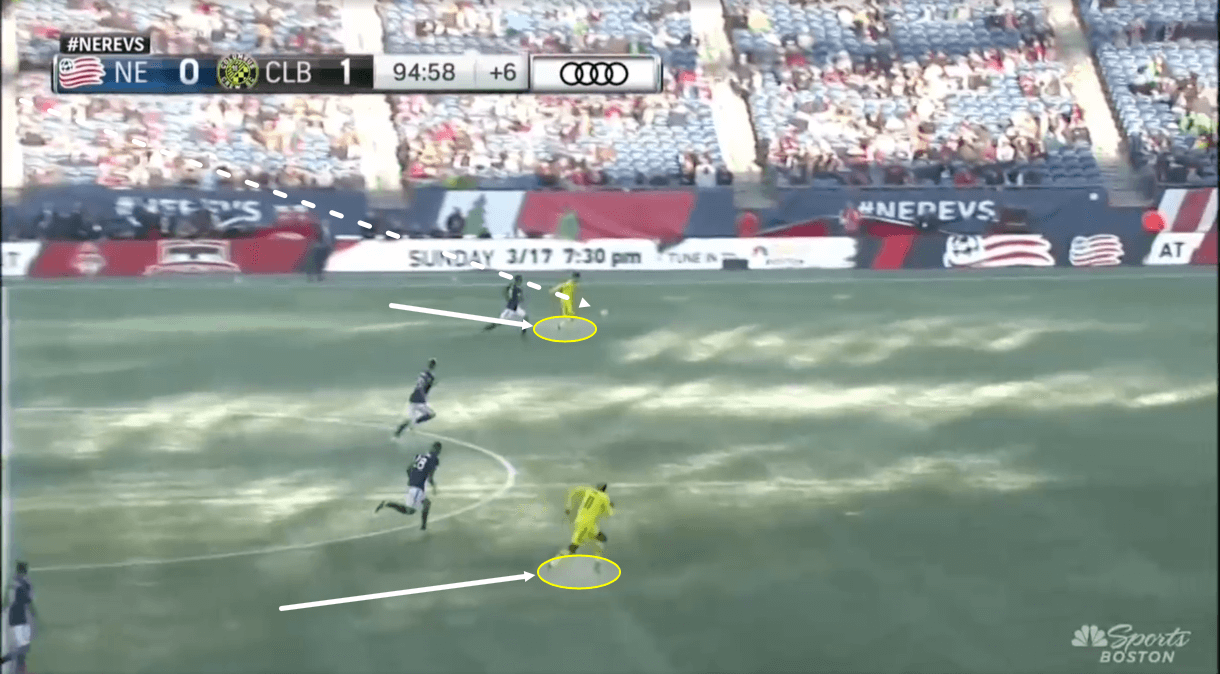
These accurate, well-struck long balls will prove useful for Düsseldorf as they look to launch quick counter-attacks off their typical low block positioning, particularly against superior opposition.
United States
Steffen is widely considered the first-choice goalkeeper for the United States Men’s National Team. After moving through the U.S. youth system, he earned his first cap in January 2018 and has made 15 total appearances. He was named United States Soccer Male Player of the Year for 2018, highlighted by a friendly against eventual world champions France in which Steffen recorded eight saves. Lastly, Steffen led the USMNT in reaching the Final of the 2019 Gold Cup, as he recorded three clean sheets in five matches.
Under manager Gregg Berhalter, the United States have often utilised counter-attacks in the offensive phases, and Steffen has been a part of that movement.
Fellow national team keeper Ethan Horvath has been consistently developing his game abroad the last two seasons at Club Brugge. If there is anyone who can put pressure on Steffen for the starting role, it’s Horvath.
Conclusion
Still, at a young age for his position, Zack Steffen has plenty of room to develop as a goalkeeper. This scout report explains how his shot-stopping and daring in positioning are both thrilling, even with the latter coming at the risk of error. Ultimately, his defensive and offensive style of play effectively match Funkel’s game model and tactics.
Düsseldorf begin the 2019/20 season with five consecutive matches against teams who finished in the top eight last season. If Steffen not only participates in but successfully performs in this early season test, then consistent playing time will likely follow, and with that will come further development.

If you love tactical analysis, then you’ll love the digital magazines from totalfootballanalysis.com – a guaranteed 100+ pages of pure tactical analysis covering topics from the Premier League, Serie A, La Liga, Bundesliga and many, many more. Buy your copy of the August issue for just ₤4.99 here, or even better sign up for a ₤50 annual membership (12 monthly issues plus the annual review) right here.

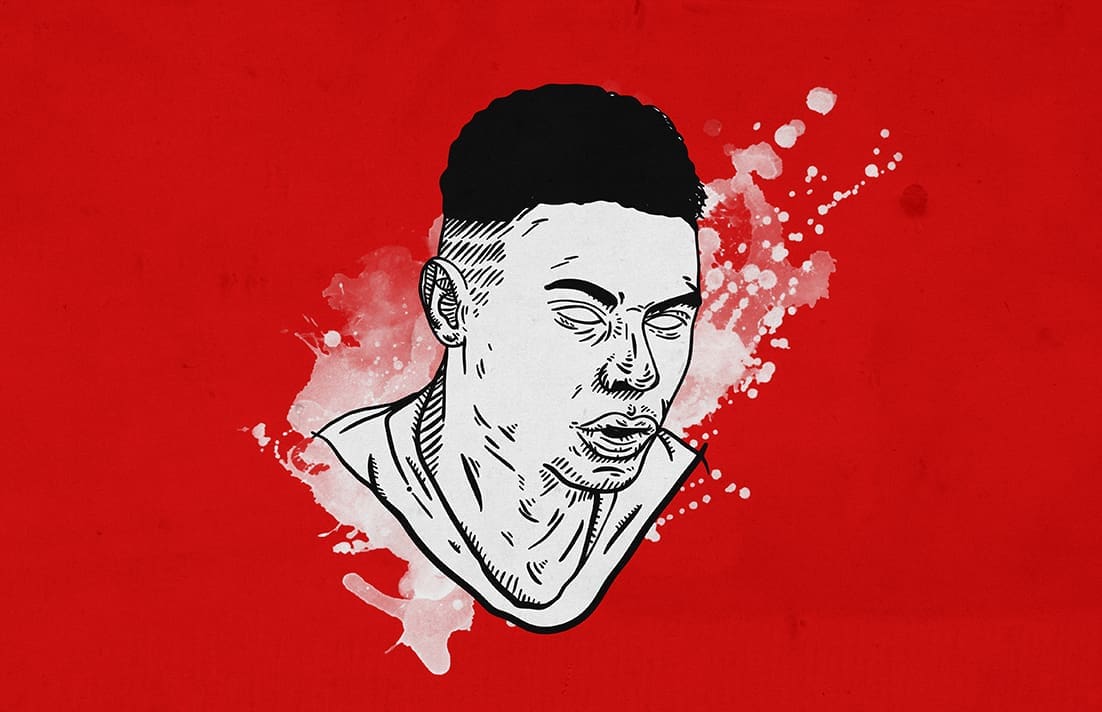



Comments